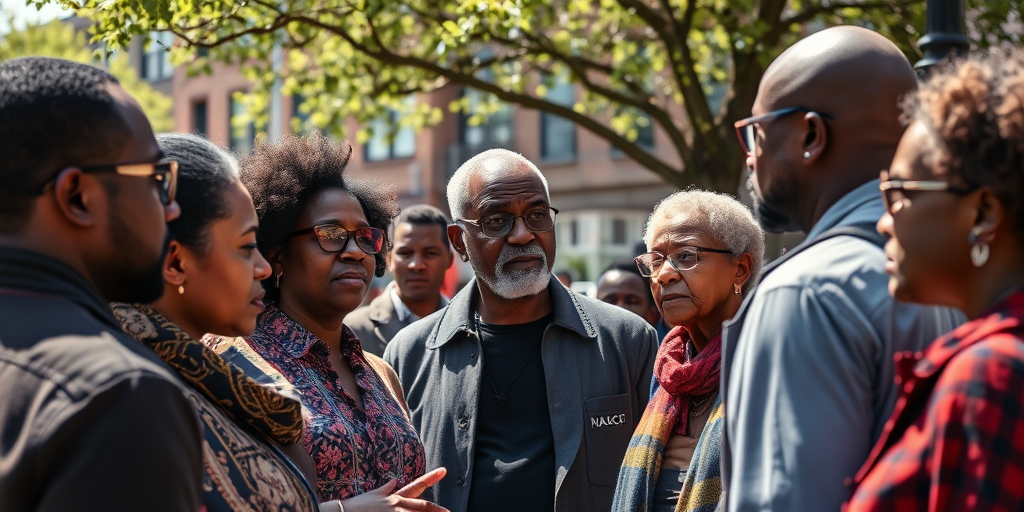Rochester Reflections: Five Years After George Floyd
ROCHESTER, Minn. – Five years have elapsed since the harrowing day when George Floyd’s death at the hands of Minneapolis police unleashed waves of protests across the nation, igniting a fierce call for addressing systemic racism. In Rochester, the echoes of those pivotal moments resonate as the community continues to seek meaningful change and deeper conversations about race.
A Call for Continued Action
As protests awakened national consciousness to issues of systemic inequality, local voices in Rochester emphasize that the journey toward racial justice is far from over. The president of the Rochester branch of the NAACP, Walé Elegbede, reinforces the community’s appeal for concrete measures to combat racial injustices. He urges a strategic emphasis on constructive policies, programs, and investments aimed squarely at dismantling the entrenched structures of racism.
“There’s a profound understanding of the issues at hand, yet it is imperative that we transition from awareness to action,” states Elegbede. “Effective change demands a concerted application of policies. Investments in communities are vital for lasting impact, ensuring the fight against systemic racism extends beyond rhetoric.”
Community Education: The Catalyst for Change
Central to this mission, as highlighted by Rochester resident Shaketa Clark, is education. According to Clark, the real work begins within the confines of our homes but gains its true force within the broader community. She emphasizes the responsibility borne by the community in empowering future generations with the awareness and understanding of systemic injustices.
“It starts at home, but the rest of the community plays an equally crucial role because our children are nurtured within this community,” Clark explains. “What might not be learned at home needs reinforcement through the community, reflecting its pivotal role in raising informed, empathetic citizens.”
Mixed Assessments of Progress
The reflections on progress since Floyd’s death reveal a tapestry of diverse opinions within Rochester. While Walé Elegbede acknowledges certain reforms within Minneapolis’s law enforcement realm following the tragedy, sentiments like those from Shaketa Clark express a more critical viewpoint. Clark remains skeptical about tangible advancements in understanding the gravity of systemic racism.
“The expectation of significant lessons emerging from Floyd’s tragic death has not materialized as hoped,” Clark asserts. “Our society was poised to learn and transform, yet there remains a substantial journey ahead us.”
The differing perspectives underscore an ongoing dialogue, as community members weigh strides taken against the backdrop of broader objectives.
The Persistent Impact: Beyond Rochester
George Floyd’s death extends its reverberations well beyond Rochester, echoing as a poignant, ongoing reminder of the broader racial justice movement. It elevates local initiatives into part of a crucial national conversation, informing advocacy, legislation, and community-based actions throughout the United States.
Though distinct in form, Rochester’s commitment reflects the overarching desire of many American communities striving to rectify historical injustices and forge equitable futures.
Linking Past to Present
Locally, Floyd’s death intersects with a longer narrative involving racial justice advocacy within Minnesota, highlighting ongoing struggles faced by communities of color. In Rochester, conversations have surfaced not only concerning policing practices but also about how systemic issues manifest in education, housing, and economic opportunities.
Acknowledging past efforts is to honor contributions made by local activists and policymakers who championed change long before Floyd’s death. These efforts form a foundation upon which current strategies are built and evaluated.
Future Implications for Rochester
Looking forward, the dual emphasis on policies and community education underscores Rochester’s methodological approach to tackling systemic racism. As reforms potentially reshape law enforcement and catalyze educational initiatives, the city is reminded of the enduring nature of this journey. Balancing pragmatic action with informed policy remains essential as Rochester seeks not only to address issues but to forge lasting, meaningful change.
Available Resources and Engagement Opportunities
As Rochester remains actively engaged in these pivotal conversations, existing resources for residents include community forums and educational workshops. Residents are encouraged to participate in formal discussions aimed at solidifying community ties and advancing shared goals toward racial equity.
Those seeking further information or wishing to contribute to ongoing efforts may contact the Rochester NAACP branch, as well as other community-based organizations active in this space, for support, dialogue, and collaborative opportunities.
George Floyd’s legacy, defined by a poignant call for justice, acts as a benchmark for ongoing advocacy. In Rochester, it inspires a renewed dedication to creating an equitable community illuminating the broader societal canvas. The local impact, kindled by community interest and residents’ engagement, remains hopeful yet vigilant, marking an ongoing quest for justice within and beyond Rochester’s borders.







